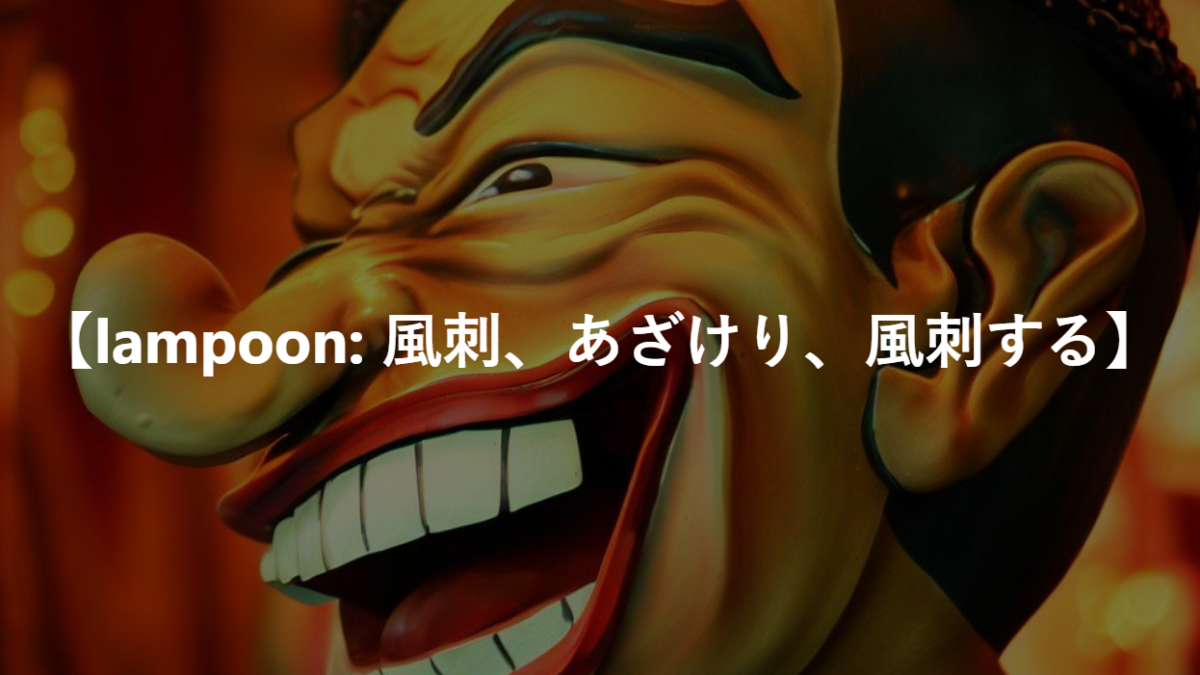語源・類義語・反対語・例文
【lampoon: 風刺、あざけり、風刺する】という単語の語源とか由来を知っていますか?
「Lampoon」(風刺、あざけり)という単語は、17世紀にフランス語の「lampon」から英語に取り入れられたとされています。このフランス語は、「飲み干せ!」という意味の飲酒歌のリフレインに由来していると考えられています。この用語がどのようにして風刺的な文学形式を指すようになったのかは完全には明らかではありませんが、風刺詩や風刺的な文章を指す言葉として英語に定着しました。
「Lampoon」が風刺的な作品を意味するようになったのは、風刺が社会的、政治的な批判をユーモアや皮肉を交えて表現することから、その起源に関連する言葉遊びや酒宴でのあざけりが風刺詩や文章における批判的な態度と結びついたためと考えられます。時間が経つにつれて、「lampoon」は特定の個人や政策、社会的慣習をあざ笑うための鋭い風刺を含む文学作品や表現を指す言葉として使われるようになりました。
The word “Lampoon” is believed to have been adopted into English in the 17th century from the French “lampon,” which was derived from the refrain of a drinking song meaning “Drink up!” The exact manner in which this term came to refer to a satirical literary form is not entirely clear, but it has become established in English as a term referring to satirical poems or writings.
The transition of “Lampoon” to mean a satirical work likely stems from the fact that satire involves expressing social and political criticism through humor and irony, linking the wordplay and mockery associated with the origins in banter and revelry at drinking parties to the critical stance found in satirical poetry and writings. Over time, “lampoon” has come to be used as a term for literary works or expressions containing sharp satire aimed at mocking specific individuals, policies, or social customs.
この単語の類義語・反対語を教えてください。
類義語
- Satire – 風刺
- Parody – パロディ
- Mockery – 嘲笑
- Ridicule – あざ笑うこと
- Spoof – からかい、もじり
- Caricature – 風刺画、誇張
- Burlesque – 風刺劇、滑稽劇
- Sarcasm – 皮肉
- Irony – 皮肉、反語
反対語
- Praise – 賞賛
- Compliment – 賛辞
- Flattery – お世辞
- Admiration – 感嘆、尊敬
- Approval – 承認
- Endorsement – 支持
- Tribute – 敬意を表するもの
- Homage – 敬意、尊敬
似た単語で間違いやすい単語はありますか?
- Parody: 「パロディ」は、作品やスタイルを真似て、コミカルな効果のためにそれを誇張することです。パロディは風刺と似ていますが、風刺が社会的または政治的メッセージを含むのに対し、パロディは主にエンターテイメントを目的としています。
- Satire: 「サティア」または「風刺」は、人々、慣習、政府などの社会的または政治的な問題を批判し、変化を促す意図でユーモア、皮肉、あざけりを用いる文芸形式です。「Lampoon」と非常に似ていますが、サティアはより広範な概念であり、風刺する対象や意図がより広い範囲に及ぶことがあります。
- Caricature: 「カリカチュア」は、特に人の外見や性格特性を誇張して描くことです。しばしばユーモアのために使用されますが、風刺の要素を含むこともあります。「Lampoon」とは異なり、カリカチュアは主に視覚的な芸術に関連しています。
- Mockery: 「モッケリー」(あざけり)は、人や事物を笑いの対象として嘲笑する行為です。これは風刺の一形態とみなすことができますが、「lampoon」よりも一般的に使用される言葉で、より広い範囲の嘲笑や軽蔑を表すことがあります。
この単語を使った例文
The columnist penned a sharp lampoon of the politician’s controversial statement.
コラムニストは、政治家の物議を醸す発言を鋭く風刺する記事を書きました。
The film is a clever lampoon of the fashion industry.
その映画は、ファッション業界を巧みに風刺しています。
His latest book lampoons the inconsistencies in modern social values.
彼の最新の本は、現代の社会価値観の不一致を風刺しています。
The cartoon series is known for lampooning famous celebrities and politicians.
そのアニメシリーズは、有名なセレブや政治家をあざけることで知られています。
The play was a humorous lampoon of the corporate world.
その劇は、企業界をユーモラスに風刺したものでした。
【lampoon: 風刺、あざけり、風刺する】のコロケーション
- Write a lampoon: 「風刺文を書く」。風刺的またはあざけるような内容の文章や作品を作成することを意味します。主に文学やジャーナリズムの文脈で使用されます。
- Political lampoon: 「政治風刺」。政治家、政策、政治的出来事を風刺的に扱う内容を指します。これは、政治的批判や社会的メッセージを伝えるために用いられることがあります。
- Lampoon in the media: 「メディアでの風刺」。新聞、雑誌、テレビ、オンラインなどのメディアで展開される風刺的な内容や作品を指します。公共の人物や時事問題などが風刺の対象となることが多いです。
- Satirical lampoon: 「風刺的なあざけり」。風刺を通じて社会的、文化的な問題を皮肉ったり、あざけったりする内容を指します。風刺の鋭い視点を持った作品や演出を示します。
- Lampoon of celebrity culture: 「セレブ文化の風刺」。有名人やセレブ文化を風刺する作品や表現を意味します。現代社会の名声やセレブリティを扱った風刺がこれに該当します。
最初に、「Write a lampoon」、これは風刺文を書くことを意味します。作家やジャーナリストが、特定の人物や出来事を風刺的に描写する際に用います。
次に、「Political lampoon」、これは政治的なテーマや人物を題材にした風刺を指します。政治的な問題に対する批判や意見をユーモアを交えて表現する際に使われます。
続いて、「Lampoon in the media」、これはメディアにおける風刺的な表現やコンテンツを指します。テレビ、ラジオ、オンラインプラットフォームなど、様々なメディアを通じて展開される風刺作品を表します。
さらに、「Satirical lampoon」、これは社会や文化に対する風刺的な視点から作成された風刺作品を指します。風刺の力を使って社会的なメッセージを伝える内容が含まれます。
最後に、「Lampoon of celebrity culture」、これはセレブ文化や有名人を題材にした風刺を意味します。現代社会の名声やセレブリティを批判的に捉えた作品が該当します。
Firstly, “Write a lampoon,” which means to write a satirical piece. Authors and journalists use this when they describe specific people or events in a satirical way.
Next, “Political lampoon,” which refers to satire that focuses on political themes or figures. It is used when expressing criticism or opinions about political issues, incorporating humor.
Then, “Lampoon in the media,” which refers to satirical expressions or content in the media. This represents satire works spread through various media channels such as television, radio, and online platforms.
Furthermore, “Satirical lampoon,” which denotes satire works created from a satirical perspective on society or culture. This includes content that conveys social messages using the power of satire.
Lastly, “Lampoon of celebrity culture,” which means satire that targets celebrity culture or famous individuals. This applies to works that critically capture the fame and celebrity culture of contemporary society.
練習問題
文法問題
問題1
Choose the correct word to complete the sentence.
“The comedian’s latest skit __ the absurdity of celebrity culture.”
(A) praised
(B) lampooned
(C) ignored
(D) endorsed
解答1
(B) lampooned
解説1
この文では「コメディアンの最新のスキットがセレブ文化の不条理を風刺した」という意味です。”lampooned” は「風刺する」という意味で、文脈に最も適しています。他の選択肢は文法的には正しいが、意味が合いません。
問題2
Fill in the blank with the correct word.
“The satirical cartoon __ the politician’s scandalous behavior.”
(A) lampooned
(B) praised
(C) concealed
(D) justified
解答2
(A) lampooned
解説2
この文では「風刺的な漫画が政治家のスキャンダラスな行動を風刺した」という意味です。”lampooned” は「風刺する」という意味で、文脈に最も適しています。他の選択肢は文法的には正しいが、意味が合いません。
問題3
Select the best option to complete the sentence.
“The writer used his blog to __ the poor service at the restaurant.”
(A) compliment
(B) lampoon
(C) ignore
(D) support
解答3
(B) lampoon
解説3
この文では「作家がブログを使ってレストランの悪いサービスを風刺した」という意味です。”lampoon” は「風刺する」という意味で、文脈に最も適しています。他の選択肢は文法的には正しいが、意味が合いません。
問題4
Complete the sentence with the appropriate word.
“The play is known for its sharp __ of political leaders.”
(A) endorsement
(B) lampooning
(C) support
(D) praise
解答4
(B) lampooning
解説4
この文では「その劇は政治指導者たちの鋭い風刺で知られている」という意味です。”lampooning” は「風刺」という意味で、文脈に最も適しています。他の選択肢は文法的には正しいが、意味が合いません。
問題5
Choose the correct option to complete the sentence.
“The magazine is famous for its __ of popular culture and current events.”
(A) support
(B) lampoon
(C) analysis
(D) justification
解答5
(B) lampoon
解説5
この文では「その雑誌はポピュラー文化や時事問題の風刺で有名である」という意味です。”lampoon” は「風刺」という意味で、文脈に最も適しています。他の選択肢は文法的には正しいが、意味が合いません。

